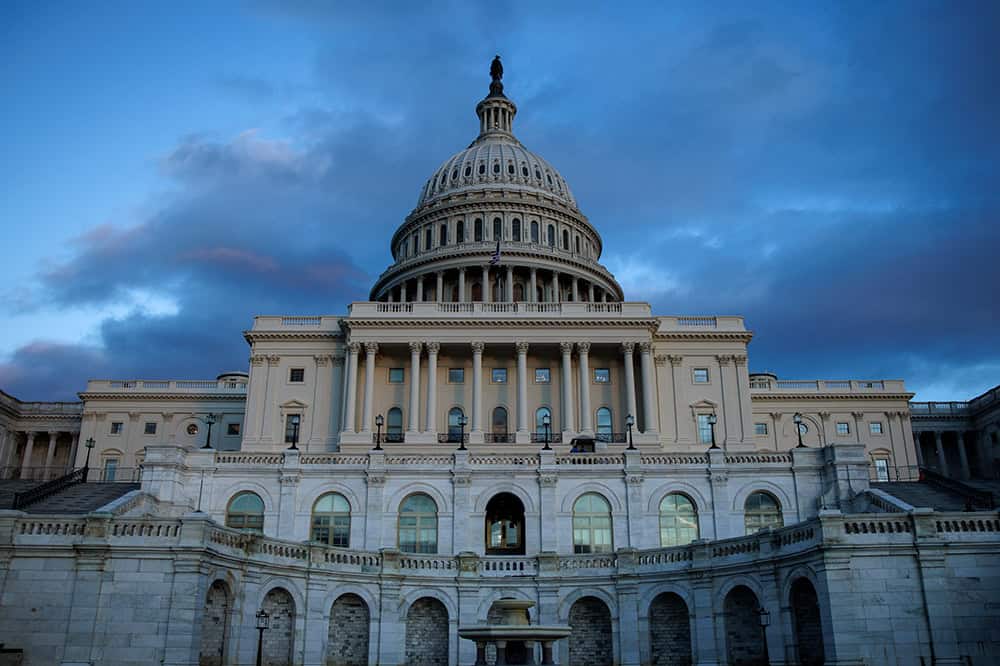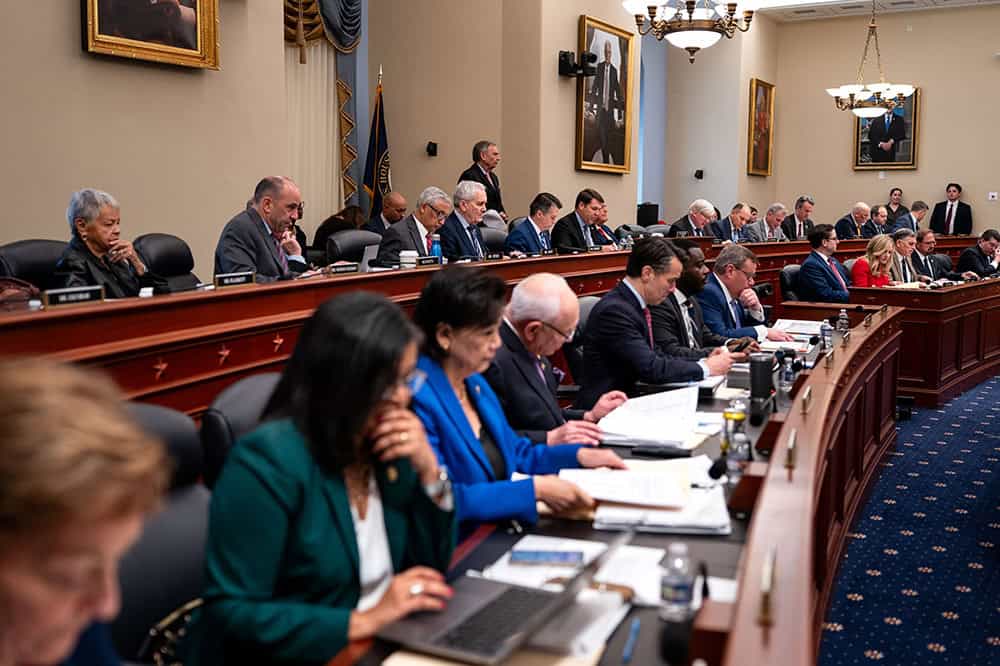With Interest Growing Rapidly, US Fiscal Confidence Falls Again
The January 2023 Fiscal Confidence Index, Modeled after the Consumer Confidence Index, is 40 (100 is Neutral)
Fiscal confidence dropped again this month, as new projections from the Congressional Budget Office show that America will pay a staggering $77 trillion in interest over the next 30 years. The Peter G. Peterson Foundation’s latest monthly survey, modeled after the Consumer Confidence Index, fell to 38 in March (100 is neutral) indicating that voters are growing more concerned about America’s unsustainable fiscal and budget outlook.
More than eight-in-10 voters (83%) say their concern about the debt has increased, up four points from last month. The vast majority of voters across party lines (78%) agree that addressing the debt should be a top-three priority for the president and Congress, up one point from last month, including 69% of Democrats, 77% of independents and 89% of Republicans.
“The national debt is already $34 trillion, but as it grows over the next three decades, we’ll spend more than double that on interest alone,” said Michael A. Peterson, CEO of the Peterson Foundation. “The path we’re on is the definition of unsustainable, and that’s why Americans want Washington to take notice, and take action. As the campaign season heats up and we face critical fiscal decisions in 2025, voters across party lines are calling for solutions that stabilize the debt and strengthen our economic future.”
A recent Peterson Foundation survey found that more than nine-in-10 voters would be more likely to support a candidate that supports a bipartisan fiscal commission to reduce the national debt, including 92% of Democrats and 94% of Republicans. Additionally, substantial majorities of voters across party lines agree a commission would reduce interest costs; strengthen Social Security; lower consumer costs; improve the economy; ensure greater tax fairness; and help free up resources to address other national priorities.
The Fiscal Confidence Index measures public opinion about the national debt by asking six questions in three key areas:
- CONCERN: Level of concern and views about the direction of the national debt.
- PRIORITY: How high a priority addressing the debt should be for elected leaders.
- EXPECTATIONS: Expectations about whether the debt situation will get better or worse in the next few years.
The survey results from these three areas are weighted equally and averaged to produce the Fiscal Confidence Index value. The Fiscal Confidence Index, like the Consumer Confidence Index, is indexed on a scale of 0 to 200, with a neutral midpoint of 100. A reading above 100 indicates positive sentiment. A reading below 100 indicates negative sentiment.
Fiscal Confidence Index Key Data Points:
- The March 2024 Fiscal Confidence Index value is 38. (The February value was 40. The January value was 41.)
- The current Fiscal Confidence Index score for CONCERN about the debt is 29, indicating deep concern about the debt. The score for debt as a PRIORITY that leaders must address is 23, indicating that Americans want elected leaders to make addressing long-term debt a high priority. The score for EXPECTATIONS about progress on the debt is 61. The Fiscal Confidence Index is the average of these three sub-category scores.
- For a description of the complete methodology, see the Appendix below.
The Peter G. Peterson Foundation commissioned this poll by the Global Strategy Group and North Star Opinion Research to survey public opinion on the national debt. The online poll included 1,006 registered voters nationwide, surveyed between March 18, 2024 and March 20, 2024. The poll has a margin of error of +/− 3.1%. The poll examined voters’ opinions on the national debt, political leadership, and America’s fiscal and economic health.
Detailed poll results can be found online at: www.pgpf.org/FiscalConfidenceIndex.
APPENDIX: Fiscal Confidence Index Methodology and Questions
- The Fiscal Confidence Index is released monthly by the Peter G. Peterson Foundation.
- The Fiscal Confidence Index value is based on six questions in three categories.
- As is done with the Consumer Confidence Index, the first step in calculating the Fiscal Confidence Index is determining the “Relative Value” for each question. This calculation is made by taking the positive response for each question and dividing it by the sum of the positive and negative responses. Each question was asked on a four-point scale, and answers were weighted according to intensity, with the strongest responses counting twice as much as the middle responses (“much” better or worse answers count twice as heavily as “somewhat” better or worse answers).
- The scores for the Concern, Priority, and Expectations categories are determined by averaging the scores derived from the two questions in each category.
- The Fiscal Confidence Index value is converted from the Relative Value to place it on a scale on which 100 indicates equal positive and negative sentiment, while values below 100 indicate negative sentiment and values above 100 indicate positive sentiment.
- The questions are as follows:
| CONCERN (29) | |||
|---|---|---|---|
| Thinking about our national debt over the last few years, would you say your level of concern has increased or decreased? ◊ Is that a lot or just a little? | March 2024 | February 2024 | January 2024 |
| Increased a lot | 53% | 50% | 51% |
| Increased a little | 29% | 28% | 29% |
| Decreased a little | 4% | 5% | 5% |
| Decreased a lot | 2% | 2% | 2% |
| (No change) | 9% | 11% | 9% |
| (Don’t Know/Refused) | 2% | 3% | 4% |
| INCREASED (NET) | 83% | 79% | 80% |
| DECREASED (NET) | 6% | 7% | 7% |
| When it comes to addressing our national debt, would you say things in the United States are heading in the right direction or do you think things are off on the wrong track? ◊ Do you feel that way strongly or just somewhat? | March 2024 | February 2024 | January 2024 |
| Right direction — Strongly | 8% | 12% | 8% |
| Right direction — Somewhat | 18% | 16% | 19% |
| Wrong track — Somewhat | 26% | 24% | 25% |
| Wrong track — Strongly | 44% | 43% | 41% |
| (Neither/Mixed) | 1% | 1% | 1% |
| (Don’t Know/Refused) | 4% | 4% | 5% |
| RIGHT DIRECTION (NET) | 26% | 28% | 28% |
| WRONG TRACK (NET) | 69% | 68% | 67% |
| PRIORITY (23) | |||
|---|---|---|---|
| Some people say that addressing the national debt should be among the president and Congress’ top 3 priorities. Do you agree or disagree? ◊ Do you feel that way strongly or just somewhat? | March 2024 | February 2024 | January 2024 |
| Strongly agree | 54% | 52% | 53% |
| Somewhat agree | 24% | 26% | 25% |
| Somewhat disagree | 13% | 12% | 13% |
| Strongly disagree | 4% | 4% | 3% |
| (Don’t Know/Refused) | 5% | 6% | 5% |
| AGREE (NET) | 78% | 77% | 79% |
| DISAGREE (NET) | 17% | 17% | 16% |
| And when it comes to our national debt, do you think it is an issue that the president and Congress should spend more time addressing or less time addressing? ◊ Would you say a lot (more or less) time or just a little? | March 2024 | February 2024 | January 2024 |
| A lot more time | 52% | 51% | 53% |
| A little more time | 32% | 31% | 29% |
| A little less time | 5% | 6% | 5% |
| A lot less time | 4% | 4% | 4% |
| (The same amount of time) | 3% | 3% | 3% |
| (Don’t Know/Refused) | 5% | 5% | 6% |
| MORE TIME (NET) | 83% | 82% | 82% |
| LESS TIME (NET) | 9% | 10% | 9% |
| EXPECTATIONS (61) | |||
|---|---|---|---|
| And thinking about our national debt over the next few years, do you expect the problem to get better or worse? ◊ Is that much (better or worse) or just somewhat (better or worse)? | March 2024 | February 2024 | January 2024 |
| Much better | 7% | 9% | 8% |
| Somewhat better | 19% | 15% | 20% |
| Somewhat worse | 34% | 34% | 32% |
| Much worse | 33% | 34% | 33% |
| (No change) | 3% | 3% | 2% |
| (Don’t know/Refused) | 4% | 5% | 5% |
| BETTER (NET) | 25% | 24% | 28% |
| WORSE (NET) | 67% | 67% | 65% |
| And when it comes to our national debt, are you optimistic or pessimistic that the United States will be able to make progress on our national debt over the next few years? ◊ Would you say you are very (optimistic or pessimistic) or just somewhat? | March 2024 | February 2024 | January 2024 |
| Very optimistic | 6% | 9% | 7% |
| Somewhat optimistic | 32% | 29% | 35% |
| Somewhat pessimistic | 35% | 34% | 33% |
| Very pessimistic | 20% | 22% | 19% |
| (Neither/Mixed) | 3% | 3% | 2% |
| (Don’t Know/Refused) | 3% | 4% | 4% |
| OPTIMISTIC (NET) | 39% | 38% | 42% |
| PESSIMISTIC (NET) | 55% | 55% | 51% |
###
ABOUT THE PETER G. PETERSON FOUNDATION
The Peter G. Peterson Foundation is a nonprofit, nonpartisan organization that is dedicated to increasing public awareness of the nature and urgency of key fiscal challenges threatening America's future, and to accelerating action on them. To address these challenges successfully, we work to bring Americans together to find and implement sensible, long-term solutions that transcend age, party lines and ideological divides in order to achieve real results. To learn more, please visit www.pgpf.org.
Further Reading
Long-Term Budget Outlook Leaves No Room for Costly Legislation
As lawmakers consider costly legislation to extend expiring tax provisions this year, CBO’s latest projections serve as a warning that our fiscal outlook is already dangerously unsustainable.
Republicans Considering Costly Tax Cut Proposals
Leaders in Congress and the Administration have outlined a broad package of tax cuts that could total $9.1 trillion.
Moody’s Warns Recent Policy Decisions Worsen U.S. Fiscal State, Maintains Negative Outlook Rating
Moody’s says that the United States is in fiscal deterioration, warning that government policy decisions in the near term could contribute to higher interest rates and worsening national debt.


